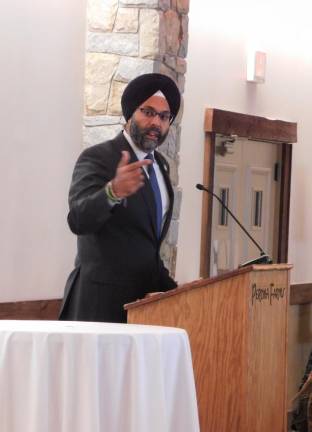Grewal: Undoing the drug crisis requires education, destigmatization, compassion
Public Safety. Attorney General Gurbir Grewal told Center for Prevention annual conference attendees that society must move away from putting the photos of addicts in the newspaper and instead move toward getting them help.

New Jersey State Attorney General Gurbir Grewal spoke to the crowded ballroom at Perona Farms on Thursday, Nov 14, as part of the morning session of the Center for Prevention’s annual conference. Grewal was warmly welcomed by the Center for Prevention and Counseling’s director Becky Carlson, who offered him a gift of honey from the family hives of her fellow C.L.E.A.R. program co-founder and Newton Police Chief Mike Richards.
Grewal, who was previously the Bergen County Prosecutor, talked about his time in that role and of Operation Helping Hand, a law enforcement partnership program that he helped develop and facilitate there.
“It wasn’t until I was in the prosecutor’s office and really on the ground level, that I began to see how the drug crisis was unfolding,” he said. “But the way we were handling things wasn’t working...We needed to stop putting people’s pictures in the paper and start treating them with compassion and offering a road to recovery.”
Grewal said that he immersed himself in research, talking to people at 12-step meetings and educating himself on every aspect of how opioid use was affecting the community.
“We then began Operation Helping Hand to break the cycle of overdose, Narcan, arrest,” he said.
Making community recovery programs a priority when he became attorney general, Grewal said he was pleased to report that all 21 New Jersey counties now have a compassionate outreach program in place.
“Every county is different,” he said. “What works in Bergen may not work in Sussex, or in Cape May, but what’s similar about us is that all these programs depend on partnerships, and law enforcement is a touch point in our communities.”
The attorney general also wanted the conference attendees to know that he and his office are not only concerned with treatment, but also education. Saying that street drugs are not the sole origin point of opioid dependence, Grewal noted that people need to be vigilant about how their doctors are prescribing painkillers.
“This isn’t about shutting down a couple of dealers,” he said to applause. “This crisis is fed by the street corner, fed by the exam room, and fed by the drug manufacturers.”
Sussex County Prosecutor Francis Koch also offered remarks to the assembled crowd. Thanking his former county prosecutor colleague for traveling to Sussex County for the event, Koch said he wanted to spread a message of positivity.
“We need to move away from ‘destigmatization’ and move toward celebration,” he said. “We need to let people know that Sussex County is a place where recovery is celebrated. Recovery is a hell that most of us will never endure, but we are saving lives and changing the narrative. We want people to know that this is a county of hope, recovery, education, and prevention.”
The conference included talks by leading recovery experts and exhibits by regional partner organizations. This year’s theme was Connecting the Continuum and focused on advances in treatment and recovery, and the recognition of new and emerging drug trends. In her opening comments, Carlson noted how important the sharing of information is to the battle to save people and towns in crisis.
The Center for Prevention and Counseling offers a wide variety of family and individual mental health and substance recovery programs. More information can be found online at www.centerforprevention.org. The Center also plays a critical role in the C.L.E.A.R. program, which can be found at www.clearprogram.org or by calling 1-844-SC-CLEAR.